Motor sports gets NEETs back on track

For young people classed as NEET – not in education, employment or training – the prospects of finding work when they lack the right qualifications and skills is minimal, especially when the economy is weak. Too often the type of young people who fall into this category come from deprived backgrounds and live in communities where expectations are low. This can increase the risk of them getting involved in antisocial behaviour and crime, as the recent riots seem to have demonstrated.
Media reports have suggested that almost half of further education colleges in England have seen a decline in student numbers since last year. It can be particularly hard for young people to engage in learning if they lack basic skills and ambition but with unemployment soaring, it is vital that they are given opportunities to develop their skills and raise their aspirations to help them get back on track.
It has long been recognised that getting youth involved in structured activities outside the classroom or work-based training can be an effective way of improving their life chances. Research published by The Centre for Excellence and Outcomes in Children and Young People’s Services (C4EO) in 2010 revealed that targeted support for young people can reap rewards in many areas, including reducing teenage parenthood, promoting positive behaviour and improving family relationships.
The Wheels Project is a scheme, sponsored by Children In Need, local schools and colleges, to get disaffected young people aged 13 to 25 interested in mechanics and participating in motor sports by competing in the British Schools Karting Championship (BSKC) to help develop their academic and social skills. Our students are predominantly from socially deprived areas in Bristol and the project provides these young people with work experience that will effectively reduce their chances of falling into the NEET category.
The youth we work with have a history of bad behaviour, truancy and low attainment at school. Many have left school, are at risk of committing crime or are currently in prison. The scheme aims to help young people gain the skills they need to continue their education at college or get a job.
Based in our motor vehicle workshops, students take part in mechanical repair, study basic skills or road safety, learn about driving and the law and attend employment workshops. Many of the young people have problems with reading, writing and arithmetic so these are embedded into the course at an appropriate level.
We have found that a lack of support from parents, difficulties at school and poor role models can not only contribute to bad behaviour but result in low self-esteem. In the practical workshop environment, working alongside our mechanics, it can be just the change of environment needed to help a young person feel like they are making a positive contribution to something rather than feeling alienated by a ‘bad apple’ label. We have seen even the most surly teens become more easygoing and fun loving when alongside some of our mechanics, who are very successful in gaining their respect. One pupil on our course was often rude, sullen and barely made eye contact with anyone, but our mechanics were able to relate to him and encourage him to join in discussions around mechanical construction and maintenance. These social skills are vital for supporting young people in the environment of further education.
Getting our students involved in the BSKC has been one of our most successful programmes. This exhilarating nation-wide motoring competition is aimed at schools and youth groups and it provides an excellent opportunity for our kids to learn. Our BSKC course involves learning about karting maintenance and driving – the young people even get the chance to actually construct a kart themselves.
The nine students who are enrolled on the course will have the opportunity to compete in the BSKC championship in teams of three. We ensure that entry into the championship is dependent on evidence of better behaviour, good attendance and an improvement in key skills. The chance to take part in karting practice sessions and compete with other teams is highly motivating and the majority of young people are able to improve on all counts.
As part of the course, the students build their own kart, which helps them understand the mechanics of it. Doing this not only teaches young people practical skills but they also talk and write about it, evaluate its performance and work out how to improve it. This helps develop both their literacy and social skills. They are also creating something of their own and the kart becomes ‘their baby’. When driving, they are learning how to be responsible on the road while gaining an understanding of lap times and other mathematical concepts.
Participating in the championship provides these kids with a real sense of achievement. It gives them an opportunity to compete with other children who may be from more privileged backgrounds on an even playing field. Once in a kart, they are not being judged by their social or economic backgrounds, only their performance on the track.
In last year’s regional finals, one of our students was close to achieving second place in the final race. Although he was beaten to the post, it gave him and his peers a real taste of success and taught them the valuable lesson that effort and concentration can make a world of difference to outcomes.
The British School Karting Championship (BSKC) takes teams of three from all types of schools, colleges and youth groups. You do not need your own kart or equipment to participate and full training is provided through a network of national karting tracks. www.bskc.co.uk
David Glossop is general manager of The Wheels Project






Responses